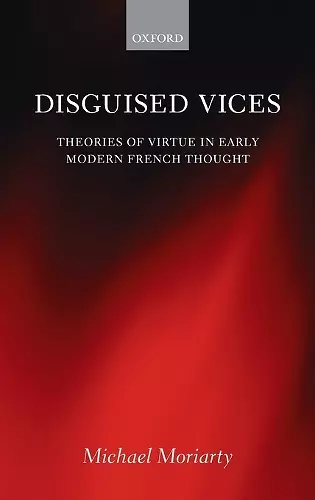Disguised Vices
Theories of Virtue in Early Modern French Thought
Format:Hardback
Publisher:Oxford University Press
Published:8th Sep '11
Currently unavailable, and unfortunately no date known when it will be back

The notions of virtue and vice are essential components of the Western ethical tradition. But in early modern France they were called into question, as writers, most famously La Rochefoucauld, argued that what appears as virtue is in fact disguised vice: people carry out praiseworthy deeds because they stand to gain in some way; they deserve no credit for their behaviour because they have no control over it; they are governed by feelings and motives of which they may not be aware. Disguised Vices analyses the underlying logic of these arguments, and investigates what is at stake in them. It traces the arguments back to their sources in earlier writers, showing how ancient philosophers, particularly Aristotle and Seneca, formulated the distinction between behaviour that counts as virtuous and behaviour that only seems so. It explains how St Augustine reinterpreted the distinction in the light of the difference between pagans and Christians, and how medieval and early modern theologians strove to reconcile Augustine's position with that of Aristotle. It examines the restatement of Augustine's position by his hard-line early modern followers (especially the Jansenists), and the controversy to which this gave rise. Finally, it examines La Rochefoucauld's critique of virtue and assesses the extent of its links with the Augustinian current of thought.
The range of enquiry is extensive, tracing the origins of early modern scepticism back to the ancients ... The author demonstrates an impressive range and depth of scholarship in his engagement with both primary sources and critical predecessors, in a style which is consistently lucid, readable, reflexive and thought-provoking. He shows how early modern debates on virtue, however remote in time, have a bearing on modern thought in their challenge to self-delusion and their affirmation of self-awareness and recognition. The impact of this illuminating book extends beyond its immediate audience in early modern scholarship, providing valuable critical insight into subsequent developments in the history of ideas in France and Europe * Comments from Prize Jury, R. H. Gapper Book Prize 2012 on the winning book *
the third part of Michael Moriarty's ambitiously and impressively conceived project on early modern thought in France ... Together, they constitute probably the most important single body of work on French seventeenth-century thought for at least a generation ... Unquestionably, Moriarty's work stands as a valuable and magisterial analysis in itself of virtue authentic or otherwise. But it also constitutes a crucial component in the wider historical and intellectual context * Henry Philips, The Seventeenth Century *
La Rochefoucauld's nuanced and complex account of human behaviour is renewed by Moriarty's exposition of the transcendant values that it both assimilates and throws into question, as the reader confronts this wilfully and artfully provocative text in which, somme toute, 'moral agency is largely an illusion'. * Richard Parish, French Studies *
- Winner of Winner of the 2012 R. H. Gapper Book Prize.
ISBN: 9780199589371
Dimensions: 240mm x 172mm x 34mm
Weight: 804g
420 pages